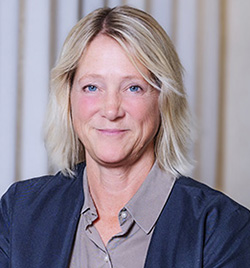New guideline for quality work is ready

An extensive task of upgrading KTH's quality work is now completed. The decision on a new guideline for systematic quality work in education was made at the President's decision meeting on 12 December.
“The system will be more value-creating where the measures are perceived as less compulsory, but those that are compulsory should really be quality-enhancing,” says Dean Sofia Ritzén.
During 2022 and 2023, the Faculty Council and Dean have been responsible for reviewing KTH's quality system for education. The now revised system came into force at the turn of the year and covers quality assurance and quality development of courses and programmes. The aim is that activities carried out by teachers, Programme Directors, Directors of First and Second Cycle Educations, and Directors of Third Cycle Educations should be meaningful in identifying quality deficiencies and rectifying them.
Greater scope
“The new system provides greater scope for teachers and Programme Directors to carry out development work. Previously, we asked Programme Directors to carry out an annual programme analysis, but now it will be every two years. By spending less time on analysis work, more space is released to develop programmes and to engage in dialogue with teachers on how their courses can be developed. We will also continuously monitor the integration of gender equality, diversity, equal conditions and sustainability.”
Several problems with the quality system were identified early in the revision process. It was not considered suitable for doctoral education, functions in the line organisation were not involved in the quality work, and teachers stated that the course analyses did not seem meaningful to them. Many teachers in particular, but also Programme Directors, felt that the system did not meet their needs.
External studies
“It was perceived as more of an administrative necessity than value creation. Therefore, we started a project where we had conversations and dialogues with teachers, Programme Directors, Directors of First and Second Cycle Educations and Directors of Third Cycle Educations.”
The review also included external studies of the processes at other universities. The quality system has been developed based on the needs that the schools see can contribute to their own work. At the same time, KTH has to relate to the regulations, she points out.
“There is legislation that says that universities must take in student feedback on all courses, analyse it and report back on what they do with the course evaluations.”

New IT system
To strengthen and facilitate the work with course evaluation and course analysis, KTH is introducing a new IT system with a higher degree of automation and clearer templates. It is called Artologik Survey&Report and will be tested during the spring semester and then introduced during the autumn semester. The idea is that a course survey will be sent out automatically so that teachers do not have to administer it.
“It will be easier for teachers to make a course analysis that they can publish publicly. The purpose of the course follow-up is also to find the courses that are not working and make action plans, which we have also been poor at.”
She also points out that the schools have Faculty Boards since 1 January 2024. The boards have a central role in monitoring the quality of education at each school. What emerges in the quality system becomes an important basis for the boards in their assessments.
Implementation work
“So there is also an organisational aspect. The decided reorganisation is also important in bringing the quality work closer to Programme Directors and teachers.”
The decision on new guidelines has been made, but Sofia Ritzén clarifies that the Faculty Council is aware that there is implementation work to be done. If certain things are discovered in the quality system that do not work, the door is open for modifications.
Text: Lars Öhman
